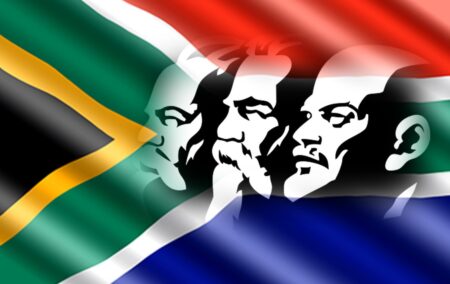The South African Communist Party has called upon communities to defend the township economy. This is one of the more fortunate consequences of the last week’s conflagration in South Africa.
On 14 July 2021, the South African Communist Party (SACP), which celebrates its centenary this year and constitutes the intellectual vanguard of the ANC, tweeted a curious poster:

The first chuckle to be had comes from the assertion that ‘socialism is the future’.
It clearly isn’t. It has failed, causing poverty, misery and stagnation, wherever it has been tried. Only a handful of countries continue to struggle along under a regime enforcing true socialism, their people poor, unhappy and afraid.
Socialism is the past, and the South African Communist Party is an anachronistic holdout of a failed 20th century ideology that was consigned to the dustbin of history decades ago.
There’s the perennial commie cliché ‘put people before profit’, which sounds appealing, but is actually self-contradictory. Who other than people earn profit? Profit is the only means to improve the quality of life of the people. People can only profit by putting the interests of other people first by supplying them with what they want.
For the banner headline, one would therefore expect a rousing exhortation of stupendous economic illiteracy, and the Communist Party does not disappoint.
‘Communities: Defend our township economy,’ the SACP entreats.
It is great to see such vocal support for the principle that in the face of an impotent state, communities have every right to defend themselves, their neighbourhoods and their businesses from violent attackers. Civilians around the country are asserting that right, and are ignoring demands from the authorities to stand down. The SACP’s support of civil self-defence is appreciated.
What is ‘our township economy’? It is, of course, the product of 27 years (and more) of free market capitalism.
Instruments of oppression
Among the instruments of oppression that created the Apartheid townships on the periphery of towns and cities was a prohibition on building business or commercial centres.
Until 1976 in Soweto, only seven self-employment categories were permitted within township boundaries: general dealerships, ‘native’ eating-houses, restaurants, milkshops, butcheries, greengrocers, and hawking. The number of businesses allowed in each township were controlled and very limited. There was virtually no economic development or local employment in townships, and most township residents had no option but to commute long distances to work in the cities.
In 1976, the number of ‘self-employment’ categories permitted in the townships was raised, first to 26, and after the Soweto Uprising of 16 June of that year, to 65. By the end of 1977, the restriction was lifted altogether, freeing township economies entirely. Ever since, the same range of businesses and services that occurred in the white towns and suburban shopping centres were permitted in townships.
Decades of oppression, however, had left the township communities impoverished and under-resourced, with a dearth of infrastructure, business skills and capital to employ. As a consequence, the township economy developed only very slowly.
The first major success was the emergence of the taxi industry, which supplied a massive demand for affordable, convenient public transport that government could (or would) not provide. It was motivated, of course, not by altruism, but by profit.
Over time, however, the townships became host to thousands of small, but growing, businesses that offered food, beverages, alcohol, tobacco, clothing, personal services, telephony, auto repair, business services, and convenient shopping close to home.
These businesses, part of an increasingly sophisticated economy, became important centres of employment as well as training grounds for new generations of entrepreneurs. And all were motivated by profit.
The township economy developed informally, and much remains informal, operating with few regulatory restrictions and away from the grasping clutches of the government’s tax collectors. The growth of this economy is a story of unfettered free market capitalism.
‘Withering away of the state’
It is heartening to see the SACP celebrate free market capitalism so candidly. It might seem confusing, certainly to them, but remember that the entire premise of communism is the ‘withering away of the state’.
In the absence of a capable government, the people will act in their own best interests. This inevitably leads to the development of markets and businesses, as people vie for the opportunity to profit from providing goods and services to their fellows.
The big flaw in communist thinking, of course, is its demand for the abolition of private property, and its belief that left to their own devices, free people would choose communal ownership of the means of production.
The township economy proves this to be a fallacy. In the absence of private property rights, the township economy cannot exist. In the last week, it was, like the rest of the economy in KwaZulu-Natal and Gauteng, the target of rioters and looters with no respect for the right to private property.
The SACP is exhorting the community to defend the township economy against bandits who attack free-market capitalist enterprises and violate private property rights.
So it is with great pleasure that I welcome the SACP to the right side of history. Long may its defence of individual rights, private property and free market capitalism last.
The views of the writer are not necessarily the views of the Daily Friend or the IRR
If you like what you have just read, support the Daily Friend

